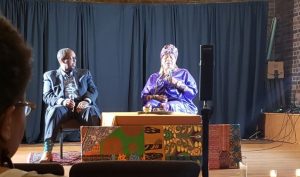 By Camille Jackson
By Camille Jackson
If Marsha Warfield could organize a dream comedy tour with anyone – dead or alive – who would she bring?
“Not the dead ones. Five days on a tour bus – can you imagine?” said the Chicago-born comedian, who was in town for one night as a special guest for Prof. Mark Anthony Neal’s comedy class.
After the laughs died down, she answered seriously.
“I would do a woman’s tour. A diverse woman’s tour, with all different kinds of women – lesbians, urban women, women of a certain age, black women…” Warfield said. “It would be dedicated to celebrating all of the things I am.”
Neal and Warfield’s public conversation paid homage to Warfield’s long and prestigious career in comedy. She knew Dave Chappelle, Eddie Griffin and Chris Rock when they were teens, still “wet behind the ears.” She was there when “Robert [Townsend] and Keenan [Ivory Wayans] said they were going to make a movie” about the struggle of black actors, a film that would become Hollywood Shuffle.
She, like many of her generation, was inspired by Dick Gregory, the rare example of a black comedian on television in his time. Gregory is the subject of Duke’s AAAS 331 course, “Dick Gregory and the History of Black Comedy,” taught by Neal. The course features guest appearances by professional comedians, critics and screenings of rare and/or classic films.
On Thursdays, the 6:15 p.m. class meets at the NorthStar Church of the Arts (220 W. Geer St.) and is free and open to the public. Registration is not necessary but RSVPs are requested. On Thursday, Oct. 10, Neal will host Bassey Ikpi, author of “I’m Telling the Truth But I’m Lying. Learn more
Nearly two dozen members of the Duke and Durham community joined Neal’s class last Thursday evening at NorthStar to hear the semi-retired comedian who has worked alongside comedy legends such as Redd Foxx, Richard Pryor and Paul Mooney.
On Mooney, who was the head writer for “The Marsha Warfield Show”:
“Paul has a body of work and contribution that can’t be unacknowledged. He wrote for everybody and I worked with him on all different kinds of things.
“He did his comedy on purpose. He could have done “The Tonight Show,” for comedians who need a laugh, a giggle, a ‘teehee’ and a ‘ha-ha’ every 30 secs, but he didn’t.
On learning from Richard Pryor:
“I did not write, I did not write “The Richard Pryor Show”! I don’t know where that rumor came from. It’s an honor for me, but it kinda takes away from the fact that there was a writer’s table… But I would have loved to get that check.
“Being in his presence was worth the price of admission but to get to work with him was to learn how to do ensemble comedy. … I was very, very fortunate.”
On working on NBC’s “Night Court”:
“I had been doing standup for about 12 years and I had done pretty well. … I was happy to get the job. It was not one of those things where I had people writing stereotypically for me. They always wrote regular stuff and I said it how I said it.
“A couple of times I would have some input. I would have Roz in African garb when she was not in uniform. I had Maxine Douglas [her character on the sitcom, “Empty Nest]” in a kente cloth lab coat.”
On the challenges of being a lesbian in Hollywood:
“[Being closeted] was just the way it was. It was an imposition. But remember I did not come into my own understanding of myself until my 20s, after I had my first relationship with a woman. It didn’t feel like a burden. I had to travel my own road. …I was uncomfortable with ‘out’ women. I had no real understanding of why I was different. … I was mad at my mother for a long time because she knew before I did.
“It breaks my heart that someone can’t live as themselves. We are living in the world among straight and gay our whole lives, why are we pretending?”
On “whiny-ass comedians” and the art of stand-up comedy:
“PC culture comes from people who grew up in a very safe environment. The Comedy Club allowed safe comedy where you were guaranteed laughs. …I’m not naming names… they have a rhythm and a formula. But that’s not what stand-up is. [The audience doesn’t] know you and they don’t care and you make them listen and make them laugh. If you can do that then you don’t worry about PC and this, that and the other. I worked in pig kicker bars on gravel roads and the truck headlights were the spotlight. Stand in your truth and take your lumps. [Comedians] are being coddled into believing that they are owed laughs and owed acceptance.
“People think stand-up is easy because everyone has gotten a laugh in their life. There is an art to making people accept what may be unacceptable. They may not be predisposed to hear what you’re saying. … If they aren’t laughing the fault is with you. The audience owes you nothing. They agreed to pay and showed up. They lived up to their obligation. You told them you were funny and could hold their attention and if you don’t that’s not their fault. Audiences haven’t gotten soft, comedians have. Someone needs to slap them and say do your job.”




